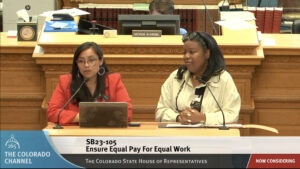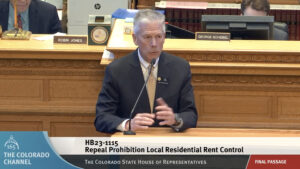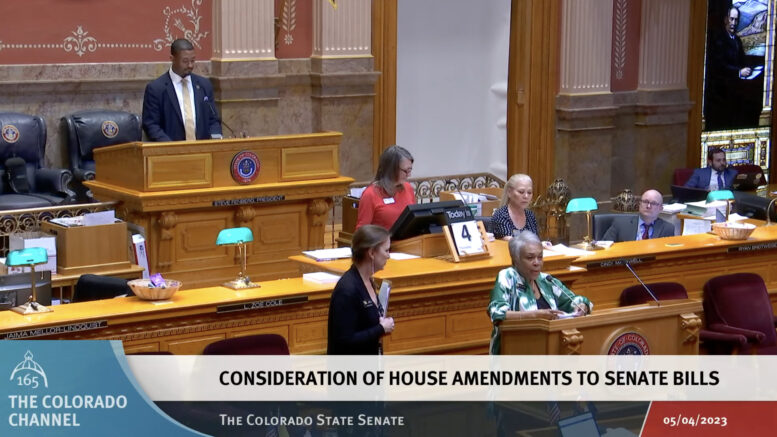Despite extensive negotiations on the part of business leaders, a bill to add more regulations to Colorado’s equal-pay law is on its way to Gov. Jared Polis’ desk in largely the same shape in which it was introduced in late January.
Senate Bill 105, sponsored by Democratic Sens. Jessie Danielson of Wheat Ridge and Janet Buckner of Aurora, received its final legislative approval Thursday when the Senate concurred with a small amendment added by the House. Now it remains to be seen if the Democratic governor will sign into law a bill with which the Colorado Department of Labor and Employment has expressed concerns.
Business leaders have, for more than a year, complained about some of the effects of the 2019-passed Equal Pay for Equal Work law, specifically its requirement that any company advertising a job opening must include a salary range. That’s led to national attention on the roughly 100 companies with no physical presence in Colorado that have said state residents are not welcome to apply for remote-enabled jobs in order to avoid complying with rules more stringent than those in any other state.
Equal pay in remote work
Business groups, working with CDLE and the Polis administration, sought an exemption from the law for companies with no physical location in Colorado and fewer than 15 remote workers here, allowing them to craft job applications that could be used nationwide. The remote-work landscape in a post-pandemic world is a very different one than that of 2019, and Colorado’s laws need to reflect the greater likelihood that national or international firms could come looking for state residents, noted Meghan Dollar, Colorado Chamber of Commerce senior vice president of governmental affairs.
But SB 105 never sought to address remote-work exemptions, with Danielson arguing women who make up the majority of the remote workforce deserve protection from facing pay differential with remote employers as much as they deserve protection with local employers. Instead, the bill seeks to double from three to six years the amount of back pay complainants can receive, give CDLE authority to investigate complaints and nix employers’ requirement to notify all staffers of jobs that workers advance into as part of a defined career progression.
After Senate Democrats rejected the Polis-requested exemption for remote companies and an amendment that would have required companies to post to Colorado employees only job opportunities that can be filled in the state, House sponsors made a small change to the bill. Under it, out-of-state companies with fewer than 15 remote workers only must issue notice to existing Colorado workers about job opportunities that can be done remotely, not those for which the workers would have to relocate to a certain physical location.

Sponsoring Reps. Serena Gonzales-Gutierrez and Jennifer Bacon speak about Senate Bill 105 on Saturday in the House.
Continuing problems with equal-pay law
The change has done nothing to satisfy groups such as the Colorado Chamber and the Denver Metro Chamber of Commerce. Rather than fix issues in the original law — SB 185, which was enacted in 2021 — it will end up doing more harm than good, they said.
“Senate Bill 105 does not clarify or even contemplate the issue of remote workers. There is still a barrier to access and a barrier to opportunities for Colorado’s job seekers,” Dollar told the House State, Civic, Veterans and Military Affairs Committee on April 24. “Employers are still working to implement Senate Bill 185. Adding additional years of back pay is not fair.”
Supporters say, however, that expansion of the original requirements in the law, which not only mandates the posting of salary ranges and the posting of open jobs to all company employees but bars employers from asking about applicants’ past salaries, are necessary to help women. As of 2021, Colorado women doing similar jobs to men were paid just 83% the salaries of their male co-workers, and requirements like SB 105 includes will strengthen the state’s economy, said Louise Myrland, vice president of programs for the Women’s Foundation of Colorado.
Benefits to employers?
Several proponents of the bill referenced a study done last year by Recruitonomics, a labor-economics research organization that found that while Colorado had 8.2% fewer job listings in 2021 than Utah, which doesn’t have salary-range requirements in listings, its labor-force participation rate rose 1.5% versus Utah’s after implementation of the law. That greater percentage of Coloradans seeking work indicates that the pay-range requirements are conducive to drawing people to apply for jobs where they know the potential compensation, giving state employers more applicant choices than competitors in other states, economic data analysts Sam Kuhn said.
“This could be more beneficial to employers. They could get more serious job candidates,” Kuhn said in an interview.
But employers argue still that that after two years of operating under the current law, the addition of new regulations is burdensome.
Practical implications
Rep. Rick Taggart, a Grand Junction Republican who ran several international outdoor-equipment firms, said, for example, that the new language around career progression is far too narrow. It doesn’t allow for employers to quickly elevate rising stars without time-consuming open-application processes, which could in turn lead those up-and-comers to leave for jobs in other states where they don’t have to jump through so many hoops.

Colorado state Rep. Rick Taggart speaks on a bill on the House floor earlier this session.
“I’d stress that if you have a star in your organization and you can’t promote them without competition, that is really going to offend them,” Taggart said.
While Polis’ labor department didn’t specifically oppose the measure during the April 24 committee hearing, CDLE legislative director Caitlin Adams said that continuing to require so much compliance from out-of-state companies doesn’t seem to help job applicants. Also, Adams said, the department is not aware of the three-year backpay requirement currently in law proving inadequate to anyone who is seeking compensation.
The governor has until June 7 to sign SB 105, veto it or let it become law without his signature.
